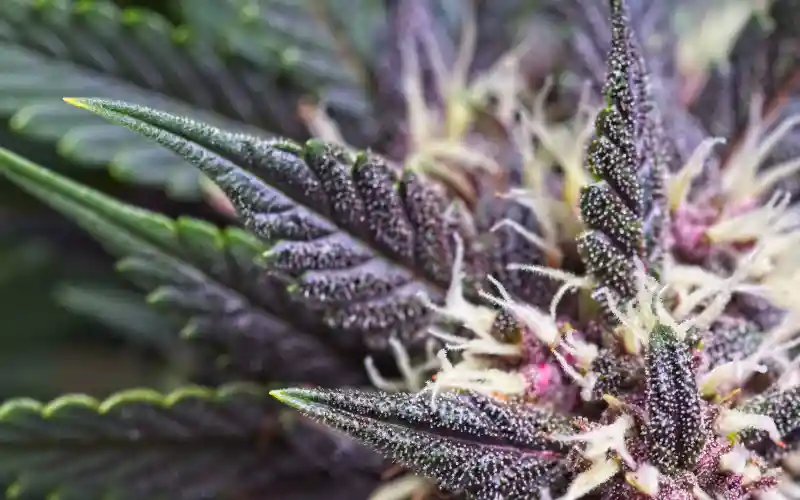Business
Worms Can Also Get the Munchies from Cannabis, Study Shows

It appears that getting high and craving junk food is not exclusively a human phenomenon…
It’s a well-known fact that using cannabis often leads to the “munchies,” prompting consumers to eat more and crave tasty, high-calorie foods. Now, a new study published in the journal Current Biology has found that cannabinoids can give worms the munchies, too — specifically, nematodes (C. elegans).
“Cannabinoids make nematodes hungrier for their favored foods and less hungry for their non-favored foods,” said study co-author Shawn Lockery in a news release. “Thus, the effects of cannabinoids in nematodes parallels the effects of marijuana on human appetites.”
Lockery added that nematodes diverged from the lineage leading to mammals more than 500 million years ago, calling it “truly remarkable” that cannabinoids’ effects on appetite have been preserved through this amount of evolutionary time.
The study was originally inspired by Oregon’s legalization of cannabis in 2015. Lockery said their lab was examining nematode food preferences, relating to research on the neuronal basis of economic decision-making, when they decided to investigate whether cannabinoids would alter their preferences.
Nematodes also look a lot more like people at the molecular level than many other species, researchers note, begging the question if the feeding effects of cannabinoids would persist across species.
Cannabinoids bind to cannabinoid receptor proteins in the brain, nervous system and other parts of the body, researchers explain. These receptors respond to endocannabinoids, which are molecules already in the body. The endocannabinoid system is known to play a crucial role in a number of bodily functions, like eating, learning, memory, reproduction and more.
Researchers demonstrated that worms exposed to anandamide, an endocannabinoid, ate more of their favorite food, with effects dependent on the presence of the worms’ cannabinoid receptors.
Further studies had researchers genetically replace the nematode cannabinoid receptor with the human cannabinoid receptor, finding that animals responded normally to cannabinoids. Researchers said this discovery emphasized the commonality of cannabinoid effects in nematodes and humans, adding that the effects of anandamide depend on neurons that play a role in food detection.
The study concluded, “In mammals, administration of THC or endocannabinoids induces hedonic feeding,” specifically citing that anandamide was shown to alter food consumption and “differentially alter appetitive behavior.”
Lockery elaborated, explaining that the sensitivity of one of the main food-detecting olfactory neurons in nematodes is “dramatically altered” by cannabinoids. He explained that, once exposed to cannabinoids, the worm becomes more sensitive to favored food odors and less sensitive to non-favored odors.
“This effect helps explain changes in the worm’s consumption of food, and it is reminiscent of how THC makes tasty food even tastier in humans,” Lockery said.
Of course, it’s simply fun to know that worms can have a similar experience to a human chowing down on a bag of Cheetos after smoking a blunt, but Lockery explained how these findings have meaningful, practical applications.
“Cannabinoid signaling is present in the majority of tissues in our body,” he said. “It therefore could be involved in the cause and treatment of a wide range of diseases. The fact that the human cannabinoid receptor gene is functional in C. elegans food-choice experiments sets the stage for rapid and inexpensive screening for drugs that target a wide variety of proteins involved in cannabinoid signaling and metabolism, with profound implications for human health.”
There are still a number of outstanding questions to explore on this issue, namely how cannabinoids change the sensitivity of nematodes’ olfactory neurons, which don’t have cannabinoid receptors. Researchers were also curious to study how psychedelics interact with nematodes in the future.
Source: https://hightimes.com/news/worms-can-also-get-the-munchies-from-cannabis-study-shows/
Business
New Mexico cannabis operator fined, loses license for alleged BioTrack fraud

New Mexico regulators fined a cannabis operator nearly $300,000 and revoked its license after the company allegedly created fake reports in the state’s traceability software.
The New Mexico Cannabis Control Division (CCD) accused marijuana manufacturer and retailer Golden Roots of 11 violations, according to Albuquerque Business First.
Golden Roots operates the The Cannabis Revolution Dispensary.
The majority of the violations are related to the Albuquerque company’s improper use of BioTrack, which has been New Mexico’s track-and-trace vendor since 2015.
The CCD alleges Golden Roots reported marijuana production only two months after it had received its vertically integrated license, according to Albuquerque Business First.
Because cannabis takes longer than two months to be cultivated, the CCD was suspicious of the report.
After inspecting the company’s premises, the CCD alleged Golden Roots reported cultivation, transportation and sales in BioTrack but wasn’t able to provide officers who inspected the site evidence that the operator was cultivating cannabis.
In April, the CCD revoked Golden Roots’ license and issued a $10,000 fine, according to the news outlet.
The company requested a hearing, which the regulator scheduled for Sept. 1.
At the hearing, the CCD testified that the company’s dried-cannabis weights in BioTrack were suspicious because they didn’t seem to accurately reflect how much weight marijuana loses as it dries.
Company employees also poorly accounted for why they were making adjustments in the system of up to 24 pounds of cannabis, making comments such as “bad” or “mistake” in the software, Albuquerque Business First reported.
Golden Roots was fined $298,972.05 – the amount regulators allege the company made selling products that weren’t properly accounted for in BioTrack.
The CCD has been cracking down on cannabis operators accused of selling products procured from out-of-state or not grown legally:
- Regulators alleged in August that Albuquerque dispensary Sawmill Sweet Leaf sold out-of-state products and didn’t have a license for extraction.
- Paradise Exotics Distro lost its license in July after regulators alleged the company sold products made in California.
Golden Roots was the first alleged rulebreaker in New Mexico to be asked to pay a large fine.
Source: https://mjbizdaily.com/new-mexico-cannabis-operator-fined-loses-license-for-alleged-biotrack-fraud/
Business
Marijuana companies suing US attorney general in federal prohibition challenge

Four marijuana companies, including a multistate operator, have filed a lawsuit against U.S. Attorney General Merrick Garland in which they allege the federal MJ prohibition under the Controlled Substances Act is no longer constitutional.
According to the complaint, filed Thursday in U.S. District Court in Massachusetts, retailer Canna Provisions, Treevit delivery service CEO Gyasi Sellers, cultivator Wiseacre Farm and MSO Verano Holdings Corp. are all harmed by “the federal government’s unconstitutional ban on cultivating, manufacturing, distributing, or possessing intrastate marijuana.”
Verano is headquartered in Chicago but has operations in Massachusetts; the other three operators are based in Massachusetts.
The lawsuit seeks a ruling that the “Controlled Substances Act is unconstitutional as applied to the intrastate cultivation, manufacture, possession, and distribution of marijuana pursuant to state law.”
The companies want the case to go before the U.S. Supreme Court.
They hired prominent law firm Boies Schiller Flexner to represent them.
The New York-based firm’s principal is David Boies, whose former clients include Microsoft, former presidential candidate Al Gore and Elizabeth Holmes’ disgraced startup Theranos.
Similar challenges to the federal Controlled Substances Act (CSA) have failed.
One such challenge led to a landmark Supreme Court decision in 2005.
In Gonzalez vs. Raich, the highest court in the United States ruled in a 6-3 decision that the commerce clause of the U.S. Constitution gave Congress the power to outlaw marijuana federally, even though state laws allow the cultivation and sale of cannabis.
In the 18 years since that ruling, 23 states and the District of Columbia have legalized adult-use marijuana and the federal government has allowed a multibillion-dollar cannabis industry to thrive.
Since both Congress and the U.S. Department of Justice, currently headed by Garland, have declined to intervene in state-licensed marijuana markets, the key facts that led to the Supreme Court’s 2005 ruling “no longer apply,” Boies said in a statement Thursday.
“The Supreme Court has since made clear that the federal government lacks the authority to regulate purely intrastate commerce,” Boies said.
“Moreover, the facts on which those precedents are based are no longer true.”
Verano President Darren Weiss said in a statement the company is “prepared to bring this case all the way to the Supreme Court in order to align federal law with how Congress has acted for years.”
While the Biden administration’s push to reschedule marijuana would help solve marijuana operators’ federal tax woes, neither rescheduling nor modest Congressional reforms such as the SAFER Banking Act “solve the fundamental issue,” Weiss added.
“The application of the CSA to lawful state-run cannabis business is an unconstitutional overreach on state sovereignty that has led to decades of harm, failed businesses, lost jobs, and unsafe working conditions.”
Business
Alabama to make another attempt Dec. 1 to award medical cannabis licenses

Alabama regulators are targeting Dec. 1 to award the first batch of medical cannabis business licenses after the agency’s first two attempts were scrapped because of scoring errors and litigation.
The first licenses will be awarded to individual cultivators, delivery providers, processors, dispensaries and state testing labs, according to the Alabama Medical Cannabis Commission (AMCC).
Then, on Dec. 12, the AMCC will award licenses for vertically integrated operations, a designation set primarily for multistate operators.
Licenses are expected to be handed out 28 days after they have been awarded, so MMJ production could begin in early January, according to the Alabama Daily News.
That means MMJ products could be available for patients around early March, an AMCC spokesperson told the media outlet.
Regulators initially awarded 21 business licenses in June, only to void them after applicants alleged inconsistencies with how the applications were scored.
Then, in August, the state awarded 24 different licenses – 19 went to June recipients – only to reverse themselves again and scratch those licenses after spurned applicants filed lawsuits.
A state judge dismissed a lawsuit filed by Chicago-based MSO Verano Holdings Corp., but another lawsuit is pending.
Source: https://mjbizdaily.com/alabama-plans-to-award-medical-cannabis-licenses-dec-1/
-

 Business2 years ago
Business2 years agoPot Odor Does Not Justify Probable Cause for Vehicle Searches, Minnesota Court Affirms
-

 Business2 years ago
Business2 years agoNew Mexico cannabis operator fined, loses license for alleged BioTrack fraud
-

 Business2 years ago
Business2 years agoAlabama to make another attempt Dec. 1 to award medical cannabis licenses
-

 Business2 years ago
Business2 years agoWashington State Pays Out $9.4 Million in Refunds Relating to Drug Convictions
-

 Business2 years ago
Business2 years agoMarijuana companies suing US attorney general in federal prohibition challenge
-

 Business2 years ago
Business2 years agoLegal Marijuana Handed A Nothing Burger From NY State
-

 Business2 years ago
Business2 years agoCan Cannabis Help Seasonal Depression
-

 Blogs2 years ago
Blogs2 years agoCannabis Art Is Flourishing On Etsy











